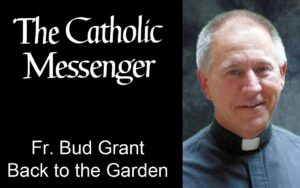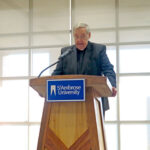By Father Bud Grant
“The mass of men (sic) serve the State thus, not as men mainly, but as machines, with their bodies.… In most cases there is no free exercise whatever of the judgment or of the moral sense…. Others, as most legislators, politicians … serve the State chiefly with their heads; and, as they rarely make any moral distinctions they are as likely to serve the devil, without intending it, as God. A very few, as heroes, patriots, martyrs, reformers in the great sense … serve the State with their consciences also, and so necessarily resist it for the most part; and they are commonly treated by it as enemies.”
 I remember the first time I read those words, looking furtively over my shoulder thinking that this was the most subversive thing I’d ever read. My second thought was: “Oh, yeah, my students are gonna read this!” The text is, of course, “Civil Disobedience” by Henry David Thoreau. It was the shot heard round the world from his home in Concord, Mass (1849). It influenced Leo Tolstoy’s attacks on Russian serfdom and conscription, Gandhi’s Satyagraha movement in South Africa, Martin Luther King Jr.’s civil rights movement, and others.
I remember the first time I read those words, looking furtively over my shoulder thinking that this was the most subversive thing I’d ever read. My second thought was: “Oh, yeah, my students are gonna read this!” The text is, of course, “Civil Disobedience” by Henry David Thoreau. It was the shot heard round the world from his home in Concord, Mass (1849). It influenced Leo Tolstoy’s attacks on Russian serfdom and conscription, Gandhi’s Satyagraha movement in South Africa, Martin Luther King Jr.’s civil rights movement, and others.
I re-read this paean to patriotism to celebrate the 4th of July. This year it seemed more poignant, prescient and pertinent than ever. Megan Rapinoe, for example, calls out racial and gender injustices in and through sports while draping herself in the flag and belting out “Born in the USA!”
On the other hand, we are shown the antithesis of patriotism — which we might call nationalism. Department of Justice lawyer Sarah Fabian, before judges and TV cameras, recently downplayed the necessity to provide migrant children (separated from their parents) with proper supervision, basic health care, education, even beds, toothpaste and soap because, well, they aren’t Americans. To not be appalled by such obscene callousness is to be complicit. Perhaps it is not surprising that American patriotism is in decline (Megan Brenan, “American Pride Hits New Low” Gallup, 7-2-19).
But patriots are those who love their country and sometimes this means being not so proud of how well our government lives up to our ideals. If to express patriotism is to follow one’s moral conscience, then it may make heroes and martyrs who will be excoriated by nationalists feigning insult to secure or retain power.
He almost certainly didn’t know it, but Thoreau echoes the theology of Thomas Aquinas. Synderesis (conscience), “said to incite to good and murmur against evil,” is the “power of reason,” and “the first natural habit” (STI.II. 79.12-13) which must be obeyed as the “the law of our mind” (STI.II.94. Ad Obj.2).
The Catholic Catechism clarifies: a person “has the right to act in conscience and in freedom so as to personally make moral decisions. He (sic) must not be forced to act contrary to his conscience” but rather “is obliged to follow faithfully what he knows to be just and right” (Nos.1778-82).
Thoreau’s patriot applies Thomas’ rational (and thus moral) conscience to matters of social justice, especially for African Americans. In “Walden” (and elsewhere) Thoreau applies it with equal conviction to “Nature,” the preservation of which requires three rules: “simplicity, simplicity, simplicity.”
In both cases, Thoreau senses that he could only be happy if his conscience was clean, and that meant standing both for the abolition of slavery and the preservation of “Wildness.” Patriotic leaders (some of them quite young) are emerging in our country and in our church “murmuring” and “inciting” our consciences toward dramatic, costly and fundamental changes in order to save creation. A few nationalist leaders, for whatever motive, still deny that there are even problems. The former risk opprobrium, the latter seek approbation. Who is the greater patriot? The better citizen? The more morally good person? I bet your own conscience can give you the right answer.
(Father Bud Grant is a professor of theology at St. Ambrose University in Davenport.)











